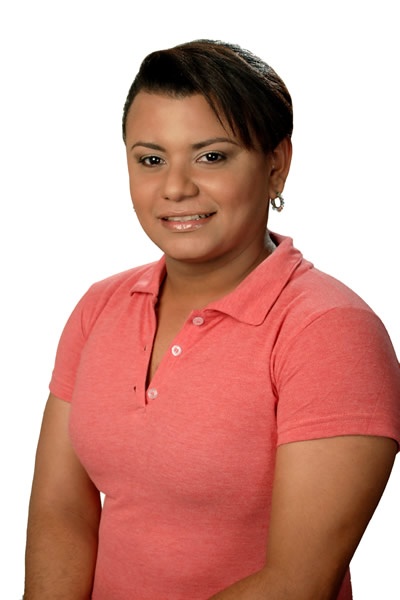News
30 Colombian LGBT advocates attend USAID-backed training
Program seeks to promote greater involvement in country’s politics
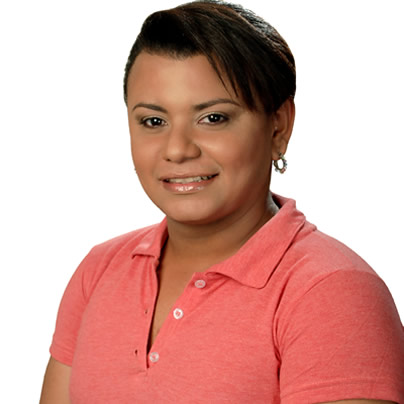
Thirty activists from across Colombia are attending a four-day training in the city of Cartagena designed to encourage LGBT people to become more involved in the country’s political process.
The program, which the Gay and Lesbian Victory Institute and the Colombian LGBT advocacy groups Caribe Afirmativo and Colombia Diversa organized, is the second to take place in the South American country as part of the USAID-backed LGBT Global Development Partnership that will contribute $11 million over the next four years to advocacy groups in Ecuador and other developing countries. Thirty activists attended the initiative’s first Colombia training that took place in Bogotá, the country’s capital, from May 30 – June 2.
Denis Dison of the Gay and Lesbian Victory Institute; Claire Lucas of USAID; National Democratic Institute Director Francisco Herrero and Tatiana Piñeros, a transgender woman who runs Bogotá’s social welfare agency, are among those who took part in a panel on Thursday that Colombia Diversa Executive Director Marcela Sánchez moderated on how out political leaders and officials can advance the Colombian and American LGBT rights movements. Jhosselyn Pájaro, a trans woman who ran for municipal council in the city of Arjona outside of Cartagena; Ramón Rojas, a councilman in the city of Chaparral in central Colombia and María Rachid, an Argentine lawmaker and LGBT rights advocate who led campaigns in support of the country’s same-sex marriage and trans rights laws that took effect in 2010 and 2012, also spoke.
“I will have the opportunity to build my capacity and be able to realize a good and better platform in regards to the next campaign,” Pájaro told the Washington Blade before the Cartagena training began. “To know how to implement a good strategy that will allow me to reach my voters is something that excites me greatly.”
The training is taking place roughly five weeks after two gay men in Bogotá became the country’s first legally recognized same-sex couple.
Colombia’s Constitutional Court in 2011 ruled gays and lesbians could seek legal recognition of their relationships within two years if lawmakers in the South American country failed to extend to them the same benefits heterosexuals receive through marriage.
The Colombian Senate in April overwhelmingly rejected a bill that would have extended marriage rights to gays and lesbians.
The Constitutional Court’s June 20 deadline passed amid lingering confusion as to whether same-sex couples could actually marry in Colombia because the 2011 ruling did not contain the word “marriage.”
Sánchez and other LGBT rights advocates consider Carlos Hernando Rivera Ramírez and Gonzalo Ruiz Giraldo married after a Bogotá civil judge solemnized their relationship on July 24. Many notaries have said they will allow gays and lesbians to enter into a “solemn contract” that is similar to an agreement into which two people enter when they purchase a home together as opposed to a civil marriage.
Anti-LGBT violence in Colombia remains a serious problem in spite of efforts to extend relationship recognition to same-sex couples in the country.
Colombia Diversa estimates 58 of the reported 280 LGBT Colombians who were murdered between 2010-2011 were killed because of their sexual orientation or gender identity and expression. A report from the Latin American and Caribbean Network of Transgender Women (REDLACTRANS) notes 61 trans Colombian women have been reported killed between 2005-2011.
Caribe Afirmativo, which works in Cartagena and other cities along Colombia’s Caribbean coastline, documented 79 LGBT residents in the region suffered “violent deaths” since the murder of the organization’s founder, Rolando Pérez, in February 2007. The group also noted 86 incidents of anti-LGBT police harassment during the same period.
Edgar Plata of Caribe Afirmativo, who uses art as a way to advocate in support of LGBT rights, and Alondra Márquez of the Santamaría Fundación, a group based in the city of Cali that advocates on behalf of trans women, discussed violence against LGBT Colombians during a D.C. panel on Aug. 22 that coincided with an Organization of American States meeting on human rights.
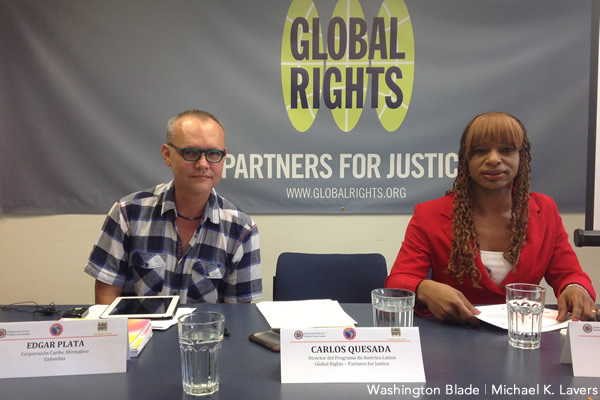
Edgar Plata of Caribe Afirmativo and Alondra Márquez of Santamaría Fundación take part in a panel on anti-LGBT violence at Global Rights in Northwest D.C. on Aug. 22, 2013. (Washington Blade photo by Michael K. Lavers)
Caribe Afirmativo Director Wilson Castañeda told the Blade on Thursday that Colombian political parties have yet to include gay-specific issues in their platforms. He added LGBT Colombians who seek to enter politics lack support and money for their campaigns and face what he described as the traditional political class that “functions more like electoral businesses than an ideological process.”
Castañeda added he feels working with the media to create visibility for LGBT Colombians is also important.
“It is important to immediately begin to generate synergies with the parties; with the current elected officials to ensure they, without being LGBT, are open to the idea,” Castañeda said.
Gay and Lesbian Victory Institute President Chuck Wolfe, who spoke on a panel during the Bogotá training, applauded the Cartagena gathering and the LGBT Global Development Partnership.
“This groundbreaking training puts into action the U.S. government’s commitment to global LGBT equality,” he told the Blade. “We are excited to work with our partners in-country and at USAID to grow the domestic participation of the LGBT community in Colombia.”
Colombia
Colombians protest against Trump after he threatened country’s president
Tens of thousands protested the US president in Bogotá

BOGOTÁ, Colombia — Tens of thousands of people on Wednesday gathered in the Colombian capital to protest against President Donald Trump after he threatened Colombian President Gustavo Petro.
The protesters who gathered in Plaza Bolívar in Bogotá held signs that read, among other things, “Yankees go home” and “Petro is not alone.” Petro is among those who spoke.
The Bogotá protest took place four days after American forces seized now former Venezuelan President Nicolás Maduro and his wife, Cilia Flores, at their home in Caracas, the Venezuelan capital, during an overnight operation.
The Venezuelan National Assembly on Sunday swore in Delcy Rodríguez, who was Maduro’s vice president, as the country’s acting president. Maduro and Flores on Monday pleaded not guilty to federal drug charges in New York.
Trump on Sunday suggested the U.S. will target Petro, a former Bogotá mayor and senator who was once a member of the M-19 guerrilla movement that disbanded in the 1990s. Claudia López, a former senator who would become the country’s first female and first lesbian president if she wins Colombia’s presidential election that will take place later this year, is among those who criticized Trump’s comments.
The Bogotá protest is among hundreds against Trump that took place across Colombia on Wednesday.
Petro on Wednesday night said he and Trump spoke on the phone. Trump in a Truth Social post confirmed he and his Colombian counterpart had spoken.
“It was a great honor to speak with the president of Colombia, Gustavo Petro, who called to explain the situation of drugs and other disagreements that we have had,” wrote Trump. “I appreciated his call and tone, and look forward to meeting him in the near future. Arrangements are being made between Secretary of State Marco Rubio and the foreign minister of Colombia. The meeting will take place in the White House in Washington, D.C.”
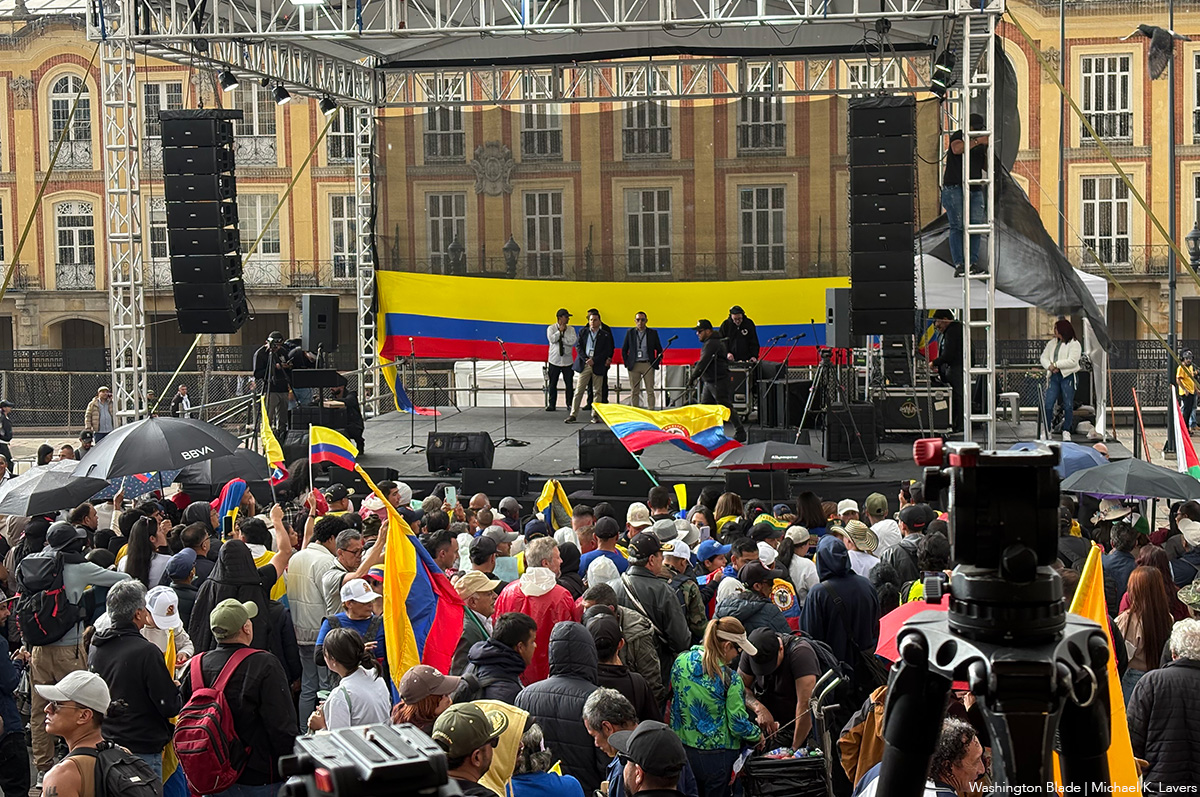
District of Columbia
Kennedy Center renaming triggers backlash
Artists who cancel shows threatened; calls for funding boycott grow

Efforts to rename the Kennedy Center to add President Trump’s name to the D.C. arts institution continue to spark backlash.
A new petition from Qommittee , a national network of drag artists and allies led by survivors of hate crimes, calls on Kennedy Center donors to suspend funding to the center until “artistic independence is restored, and to redirect support to banned or censored artists.”
“While Trump won’t back down, the donors who contribute nearly $100 million annually to the Kennedy Center can afford to take a stand,” the petition reads. “Money talks. When donors fund censorship, they don’t just harm one institution – they tell marginalized communities their stories don’t deserve to be told.”
The petition can be found here.
Meanwhile, a decision by several prominent musicians and jazz performers to cancel their shows at the recently renamed Trump-Kennedy Center in D.C. planned for Christmas Eve and New Year’s Eve has drawn the ire of the Center’s president, Richard Grenell.
Grenell, a gay supporter of President Donald Trump who served as U.S. ambassador to Germany during Trump’s first term as president, was named Kennedy Center president last year by its board of directors that had been appointed by Trump.
Last month the board voted to change the official name of the center from the John F. Kennedy Memorial Center For The Performing Arts to the Donald J. Trump And The John F. Kennedy Memorial Center For The Performing Arts. The revised name has been installed on the outside wall of the center’s building but is not official because any name change would require congressional action.
According to a report by the New York Times, Grenell informed jazz musician Chuck Redd, who cancelled a 2025 Christmas Eve concert that he has hosted at the Kennedy Center for nearly 20 years in response to the name change, that Grenell planned to arrange for the center to file a lawsuit against him for the cancellation.
“Your decision to withdraw at the last moment — explicitly in response to the Center’s recent renaming, which honors President Trump’s extraordinary efforts to save this national treasure — is classic intolerance and very costly to a non-profit arts institution,” the Times quoted Grenell as saying in a letter to Redd.
“This is your official notice that we will seek $1 million in damages from you for this political stunt,” the Times quoted Grenell’s letter as saying.
A spokesperson for the Trump-Kennedy Center did not immediately respond to an inquiry from the Washington Blade asking if the center still planned to file that lawsuit and whether it planned to file suits against some of the other musicians who recently cancelled their performances following the name change.
In a follow-up story published on Dec. 29, the New York Times reported that a prominent jazz ensemble and a New York dance company had canceled performances scheduled to take place on New Year’s Eve at the Kennedy Center.
The Times reported the jazz ensemble called The Cookers did not give a reason for the cancellation in a statement it released, but its drummer, Billy Hart, told the Times the center’s name change “evidently” played a role in the decision to cancel the performance.
Grenell released a statement on Dec. 29 calling these and other performers who cancelled their shows “far left political activists” who he said had been booked by the Kennedy Center’s previous leadership.
“Boycotting the arts to show you support the arts is a form of derangement syndrome,” the Times quoted him as saying in his statement.
District of Columbia
New interim D.C. police chief played lead role in security for WorldPride
Capital Pride says Jeffery Carroll had ‘good working relationship’ with organizers
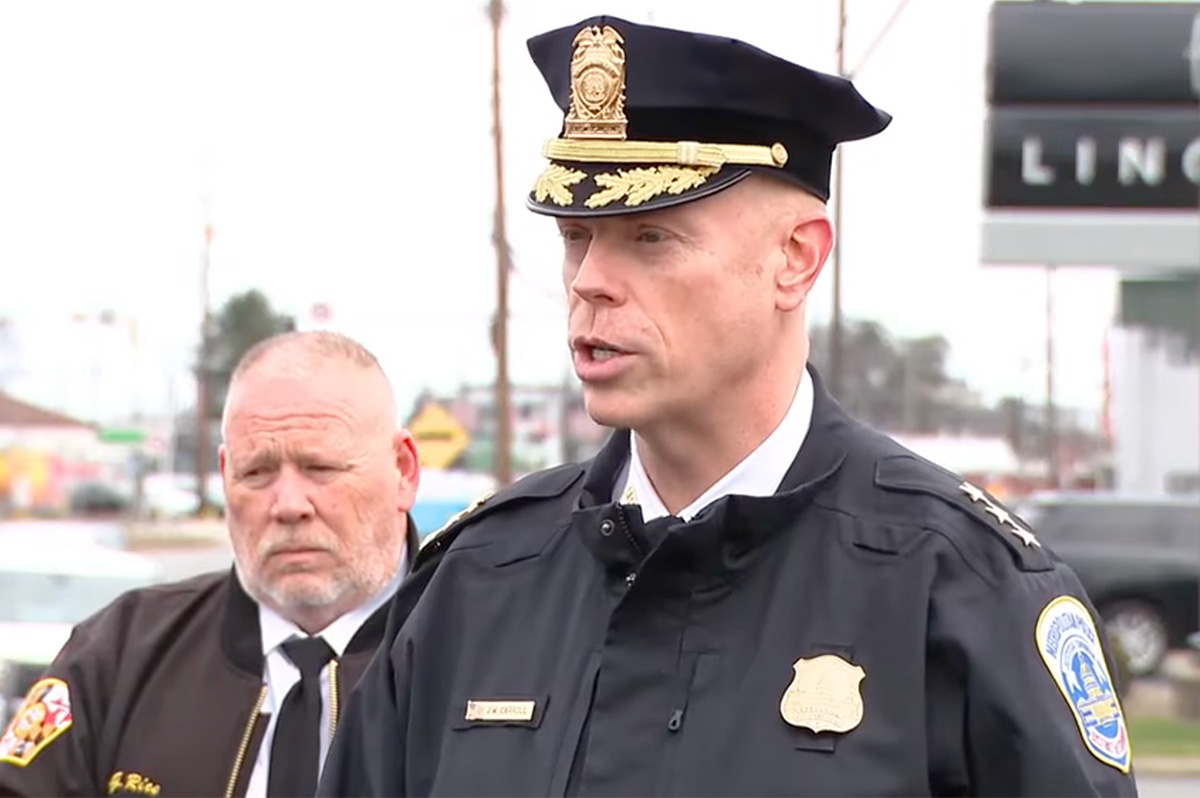
Jeffery Carroll, who was named by D.C. Mayor Muriel Bowser on Dec. 17 as the city’s Interim Chief of Police, played a lead role in working with local LGBTQ community leaders in addressing public safety issues related to WorldPride 2025, which took place in D.C. last May and June
“We had a good working relationship with him, and he did his job in relation to how best the events would go around safety and security,” said Ryan Bos, executive director of Capital Pride Alliance.
Bos said Carroll has met with Capital Pride officials in past years to address security issues related to the city’s annual Capital Pride parade and festival and has been supportive of those events.
At the time Bowser named him Interim Chief, Carroll had been serving since 2023 as Executive Assistant Chief of Specialized Operations, overseeing the day-to-day operation of four of the department’s bureaus. He first joined the D.C. Metropolitan Police Department in 2002 and advanced to multiple leadership positions across various divisions and bureaus, according to a statement released by the mayor’s office.
“I know Chief Carroll is the right person to build on the momentum of the past two years so that we can continue driving down crime across the city,” Bowser said in a statement released on the day she announced his appointment as Interim Chief.
“He has led through some of our city’s most significant public safety challenges of the past decade, he is familiar with D.C. residents and well respected and trusted by members of the Metropolitan Police Department as well as our federal and regional public safety partners,” Bowser said.
“We have the best police department in the nation, and I am confident that Chief Carroll will meet this moment for the department and the city,” Bowser added.
But Bowser has so far declined to say if she plans to nominate Carroll to become the permanent police chief, which requires the approval of the D.C. City Council. Bowser, who announced she is not running for re-election, will remain in office as mayor until January 2027.
Carroll is replacing outgoing Chief Pamela Smith, who announced she was resigning after two years of service as chief to spend more time with her family. She has been credited with overseeing the department at a time when violent crime and homicides declined to an eight-year low.
She has also expressed support for the LGBTQ community and joined LGBTQ officers in marching in the WorldPride parade last year.
But Smith has also come under criticism by members of Congress, who have accused the department of manipulating crime data allegedly showing lower reported crime numbers than actually occurred. The allegations came from the Republican-controlled U.S. House Oversight Committee and the U.S. Justice Department
Bowser has questioned the accuracy of the allegations and said she has asked the city’s Inspector General to look into the allegations.
Meanwhile, a spokesperson for the D.C. police Office of Public Affairs did not immediately respond to a question from the Washington Blade about the status of the department’s LGBT Liaison Unit. Sources familiar with the department have said a decline in the number of officers currently working at the department, said to be at a 50-year low, has resulted in a decline in the number of officers assigned to all of the liaison units, including the LGBT unit.
Among other things, the LGBT Liaison Unit has played a role in helping to investigate hate crimes targeting the LGBTQ community. As of early Wednesday an MPD spokesperson did not respond to a question by the Blade asking how many officers are currently assigned to the LGBT Liaison Unit.
-

 Photos5 days ago
Photos5 days agoThe year in photos
-

 Sponsored3 days ago
Sponsored3 days agoSafer Ways to Pay for Online Performances and Queer Events
-

 District of Columbia3 days ago
District of Columbia3 days agoTwo pioneering gay journalists to speak at Thursday event
-

 a&e features3 days ago
a&e features3 days agoQueer highlights of the 2026 Critics Choice Awards: Aunt Gladys, that ‘Heated Rivalry’ shoutout and more

